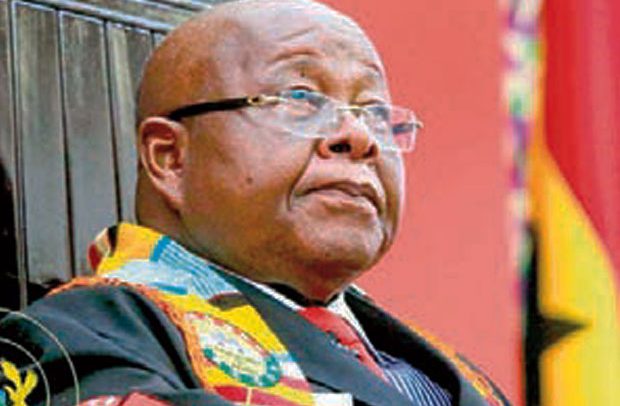Prof. Mike Oquaye
The Constitutional Instrument that gives a legal framework for the Electoral Commission (EC) to compile a new register of voters in preparation towards the 2020 presidential and parliamentary elections has been backed by Members of Parliament (MPs).
The Public Elections (Registration of Voters) (Amendment) Regulations, 2020 (C.I.126) passed its final hurdle yesterday in Parliament by 106 votes to 92 against after a heated debate.
With the passage, it has come to amend the Public Elections (Registration of Voters) Regulations, 2016 (C.I. 91) “in conformity with the decision of the Supreme Court on the subject matter.”
The instrument took 21 sitting days of Parliament for the C.I. 126 to mature and pass the stages in the House, after it was laid on Tuesday, March 31, 2020, in accordance with Article 11(7) of the 1992 Constitution.
Pursuant to Orders 77 and 166 of the Standing Orders of Parliament, the Speaker, Prof. Mike Oquaye, referred the instrument to the Committee on Subsidiary Legislation for consideration and report.
By the provisions of Article 51 of the Constitution, the EC is mandated to make regulations for the effective performance of its functions and in particular, for the registration of voters, the conduct of public elections and referenda, including provision for voting by proxy.
NDC ‘Division’
MPs gave their final approval to the legislation after the Minority Leader, Haruna Iddrisu, had called for a “division” (secret balloting) to decide on the C.I. 126 which his side vehemently opposed and called for it to be annulled by the House.
Vice Chairman of the Committee, Bernard Ahiafor, re-laid the report yesterday on behalf of the MP for Bolgatanga East, Dr. Dominic Ayine, who chairs the committee.
Speaker Mike Oquaye had called for the earlier report laid in the House to be withdrawn following last Friday’s incident in which the report was rejected and the debate postponed.
Committee Observation
The committee made three key observations during deliberations, and said the C.I 126 seeks to amend regulation 1 (3) of C.I.91 by excluding the use of a driver’s licence as a requirement for the registration of a voter.
Dr. Ayine, reading a report, stated that the EC told the committee its decision to ban the use of a driver’s licence as a form of identification for registration of a voter, stems from the fact that both Ghanaians and foreigners are eligible to be issued a driver’s licence.
“It is, therefore, the view of the commission that the driver’s licence cannot serve as a form of citizenship identification that safeguards against registration of foreigners during the voter registration,” the report indicated.
The commission added that the process by which a person acquires a driver’s licence issued by the Driver and Vehicle Licensing Authority (DVLA) is different from the process used by the commission in issuing the voter identification card, the committee reported.
“Some members took the view that the commission failed to provide sufficient justification for the proscription of the driver’s licence as proof of citizenship for voter registration, especially when the driver’s licence, on its face, differentiates between citizens and foreigners,” Dr. Ayine recounted.
Voter ID
The committee again observed that the use of the existing voter identification card as an evidence of identity in the registration of a voter as contained in the existing Constitutional Instrument (Cl. 91) is prohibited by C.I. 126.
The committee reported that the EC explained that in Abu Ramadan &Anor v. Electoral Commission & Another Suit N0. J8/ 108/2016, the Supreme Court ordered the EC to delete and clean the voters’ register of the names of persons who had used the National Health Insurance Authority (NHIA) Card as proof of identity to register as voters.
The commission told the committee, in compliance with the order of the Supreme Court, a total of 56,000 names, which were detected to have been registered using the NHIA Card, was deleted from the voters’ register.
The Supreme Court also directed that those whose names would be deleted must be given the opportunity to re-register, using other acceptable identification documents. The commission explained that, out of the 56,000 names, about 29,000 names were deleted and the persons were permitted to re-register.”
By Ernest Kofi Adu, Parliament House


